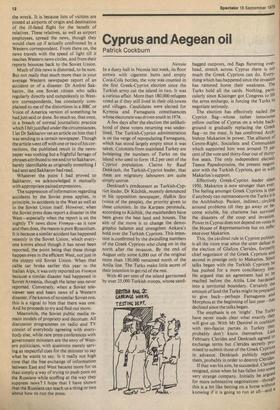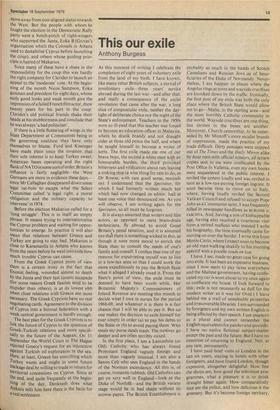Cyprus and Aegean oil
Patrick Cockburn
Nicosia In a dusty hall in Nicosia last week, its floor strewn with cigarette butts and empty Coca-Cola bottles, the vote was counted in the first Greek-Cypriot election since the Turkish army cut the island in two. It was a curious affair. More than 180,000 refugees voted as if they still lived in their old towns and villages. Candidates were elected for Kyrenia and Famagusta constituencies whose electorate was driven south in 1974.
A few days after the election the unlikelihood of these voters returning was underlined. The Turkish-Cypriot administration is on the verge of repopulating Famagusta, which has stood largely empty since it was taken. Colonists from mainland Turkey are bolstering the numbers of Turks on the island who used to form 18.2 per cent of the Cypriot population. Claims by Rauf Denktash, the Turkish-Cypriot leader, that these are migratory labourers are quite simply untrue.
Denktash's predecessor as Turkish-Cypriot leader, Dr Ktichiik, recently denounced in his opposition newspaper, Ha/kin Sesi (voice of the people), the priority given to these colonists. In the Karpass peninsula, according to Kiichilk, the mainlanders have been given the best land and houses. The aim of the move is to change the demographic balance and strengthen Ankara's hold over the Turkish Cypriots. This intention is confirmed by the dwindling numbers of the Greek Cypriots who clung on in the north after the invasion. By the end of August only some 6,000 out of the original more than 150,000 remained north of the Attila line. The Turks make little secret of their intention to get rid of the rest.
With 40 per cent of the island garrisoned by over 25,000 Turkish troops, whose sand
bagged outposts, red flags fluttering overhead, stretch across Cyprus there is not much the Greek Cypriots can do. Everything which has happened since the invasion has rammed home their weakness. The Turks hold all the cards. Nothing, particularly since Kissinger got Congress to lift the arms embargo, is forcing the Turks to negotiate seriously.
The election has effectively nailed the Cypriot flag—whose rather innocuous yellow outline of Cyprus on a white background is gradually replacing the Greek flag—to the mast. It has confirmed Archbishop Makarios in power. The alliance or. Centre-Right, Socialists and Communists which supported him won around 75 Per cent of the vote and thirty-four out of thirtyfive seats. The only independent elected, Tassos Papadopoulos, the present negott" ator with the Turkish Cypriots, got in with Makarios's support.
Effectively Greek-Cypriot leader since 1950, Makarios is now stronger than ever. The feeling amongst Greek Cypriots is that if anybody can outmanoeuvre the Turks it is the Archbishop. Patient, indirect,, circling around problems till they go away or become soluble, his charisma has survived the disasters of the coup and invasion. Power in Cyprus does not depend on votes In the House of Representatives but on influence over Makarios.
This, the cardinal rule in Cypriot politics, is all the more true since the utter defeat ,111 the election of Glafcos Clerides, formerlY chief negotiator of the Greek Cypriots and second in prestige only to Makarios. Since talks began with the Turkish Cypriots he has pushed for a more conciliatory line' He argued that an agreement had to be reached before the Attila Line hardened into a territorial boundary. Certainly the amount of land the Turks might be prepared to give back—perhaps Famagusta and Morphou at the beginning of last year-1135 declined since the talks began. The emphasis is on 'might'. The Turks have never made clear what exactly theY will give up. With Mr Demirel in coalition with neo-fascist parties in Turkey they probably don't know themselves. Last February Clerides and Denktash agreed to exchange terms but Clerides secretly Pr°mised to submit those of the Greek Cypri0ts. in advance. Denktash publicly rejected them, probably in order to destroy Clerides. If that was his aim, he succeeded. Clerides resigned, since when he has fallen into sortie very strange company. Initially he argued, for more substantive negotiations—thougn this is a bit like betting on a horse without knowing if it is going to run at all– -and 3
move away from non-aligned status towards the West. But the people with whom he fought the election in the Democratic Rally Party were a hotch-potch of right-wingers Who supported the Junta, Eoka B (Grivas's organisation which the Colonels in Athens used to destabilise Cyprus before launching the ,coup), and others whose guiding principle is hatred of Makarios.
Since many of these have a share in the responsibility for the coup this was hardly the right company for Cler ides to launch an appeal to the 'moderate' vote. At the beginning of the month Nicos Sampson, Eoka gunman and president for eight days, whose surly good looks and weak mouth give the impression of a failed French film actor, drew twenty years for his part in the coup. Clerides's old political friends shake their heads at his stubbornness and conclude that he was always 'a bad politician'.
If there is a little fluttering of wings in the State Department at Communists being in the governing coalition they have only themselves to blame. Ford and Kissinger have made plain since the invasion that their sole interest is to keep Turkey sweet, American bases operating and the right flank of NATO in some sort oforder.Britain's influence is fairly negligible—the West Germans are more in evidence these days— since Mr Callaghan disappeared down some legal rat-hole to escape what the Select Committee called 'a legal right, a moral Obligation and the military capacity to intervene' in 1974.
Before the election Makarios called for a 'long struggle'. This is in itself an empty Phrase. It means trying to internationalise the Cyprus problem and waiting for opportunities to emerge. In practice it will alsomean that relations between Greece and Turkey are going to stay bad. Makarios is Close to Karamanlis in Athens who knows from the years before he went into exile how Much trouble Cyprus can cause.
From the Greek Cypriot point of view there is a certain irony in the fact that Enosist feeling, wounded almost to death by the Junta and their last lunatic escapade (for some reason Greek fascists tend to be stupider than others), is at its lowest ebb When close relations with Greece are most necessary. The Greek Cypriots have no real negotiating cards. Agreement to the division of Cyprus into a bizonal federation with a weak central government is hardly enough.
The best plan for the Greek Cypriots is to link the future of Cyprus to the question of Greek-Turkish relations and more specifically to the future of the Aegean. On II September the World Court in The Hague ,rejected Greece's request for an injunction against Turkish oil exploration in the sea. Here, at least, Greece has something which Turkey wants and might in some future Package deal be willing to trade in return for territorial concessions on Cyprus. Since at the end, and quite frequently at the begin ning of the day, Denktash does what Ankara tells him here there is the basis for areal settlement.






































 Previous page
Previous page